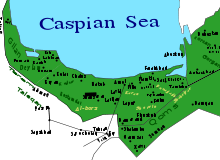Tabaristão

Tabaristão ou Tapuristão é uma região histórica do Irã. Estendia-se do sul e sudeste do Mar Cáspio por uma área de 500 de comprimento e 70 de largura. Corresponde às atuais províncias de Mazandaran, Gilan, Gulistan e a província do norte de Semnan, bem como uma pequena região do Turcomenistão.
Ele também é conhecido por ser o local de nascimento de Tabarî, um historiador persa e exegeta (tafsir) da fé muçulmana sunita.
origem[editar | editar código-fonte]
Tapuri ou Tapyri[1] eram uma tribo nos medos ao sul do Mar Cáspio mencionada por Ptolomeu e Arriano .[2] Ctesias refere-se à terra de Tapuri entre as duas terras de Cadusii e Hyrcania .[3]
O nome e as prováveis habitações dos Tapuri parecem, em diferentes períodos da história, ter se estendido ao longo de um amplo espaço de país desde a Armênia até o lado oriental do Oxus. Estrabão os coloca ao lado dos Portões do Cáspio e Rhagae, na Pártia ou entre os Derbices e Hyrcani ou em companhia dos Amardi e outros povos ao longo das margens sul do Cáspio; em que a última visão Curtius, Dionísio e Plínio pode ser considerada coincidente. Ptolomeu em um lugar os considera entre as tribos da Média, e em outro os atribui a Margiana. Seu nome está escrito com algumas diferenças em diferentes autores; assim Τάπουροι e Τάπυροι ocorrem em Strabo; Tapuri em Plínio e Cúrcio; Τάπυρροι em Steph. B. sub voce Não pode haver dúvida de que o atual distrito de Tabaristão deriva seu nome deles. Aelian dá uma descrição peculiar dos Tapuri que moravam na Média.[2]
Ver também[editar | editar código-fonte]
Referências
- ↑ Tapuri. The mountains inland from the coast of Hyrcania are called the “Tapurian mountains” by Arrian, after the people there, settled in the mountains between the Derbices and the Hyrcanii (Str., 11.9.1, 11.11.8). They are spread toward the Caspian Gates and Rhaga in Media (Ptol., 6.2.6).These western Tapuri could have resulted from a tribal division north of the Sarnius/Atrak river—another, perhaps ancestral, group, the Tapurei, is located by Ptolemy (6.14.12) in Scythia. The remainder moved south and east into Margiana (“between the Hyrcani and the Arii,” Str., 11.8.8; Ptol., 6.10.2) along the Ochus/Arius (mod. Tejen/Hari-rud) river into Aria (cf. Polyb., 10.49). The Tapuri on the Caspian could, alternatively, represent a later westward migration along the main east-west highway from Margiana. These Tapuri furnished 1,000 cavalry for the battle of Gaugamela (Curt., 3.2.7), apparently aligned with the Hyrcanii (the “Topeiri,” Arr., An. 3.8.4). Alexander later subdued them (Arr., An. 3.23.1-2; Polyb., 5.44.5; Curt., 6.4.24-25). A separate satrap administered them at the time of Alexander’s arrival, and this official was assigned the Caspian Mardi as well (Arr., An. 3.22.7, 24.3; 4.18.2)., IRANICAONlINE IRAN v. PEOPLES OF IRAN (2) Pre-Islamic
- ↑ a b «Dictionary of Greek and Roman Geography, illustrated by numerous engravings on wood. William Smith, LLD. London. Walton and Maberly, Upper Gower Street and Ivy Lane, Paternoster Row; John Murray, Albemarle Street. 1854. ,TAPU´RI». www.perseus.tufts.edu. Consultado em 4 de fevereiro de 2021
- ↑ Of the lands which lie on the sea and of the others which border on these, Ninus subdued Egypt and Phoenicia, then Coele-Syria, Cilicia, Pamphylia, and Lycia, and also Caria, Phrygia, and Lydia; moreover, he brought under his sway the Troad, Phrygia on the Hellespont, Propontis, Bithynia, Cappadocia, and all the barbarian nations who inhabit the shores of the Pontus as far as the Tanais; he also made himself lord of the lands of the Cadusii, Tapyri, Hyrcanii, Drangi, of the Derbici, Carmanii, Choromnaei, and of the Borcanii, and Parthyaei; and he invaded both Persis and Susiana and Caspiana, as it is called, which is entered by exceedingly narrow passes, known for that reason as the Caspian Gates. 4 Many other lesser nations he also brought under his rule, about whom it would be a long task to speak. But since Bactriana was difficult to invade and contained multitudes of warlike men, after much toil and labour in vain he deferred to a later time the war against the Bactriani, and leading his forces back into Assyria selected a place excellently situated for the founding of a great city.. Diodorus Siculus, Library 1-7 (2.2.3)
